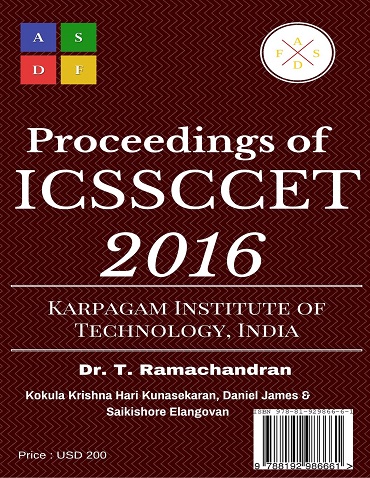- Publication Meta:Value
- Short Title:ICSSCCET 2016
- Publisher:ASDF, India
- ISBN 13:978-81-929866-6-1
- ISBN 10:81-929866-6-7
- Language:English
- Type:Hard Bound - Printed Book
- Copyrights:ICSSCCET Organizers / DCRC, London, UK
- Editor-in-Chief:Dr T Ramachandran
- Conference Dates:18 - 19, March 2016
- Venue Country:Coimbatore, India
- Submitted Papers:825
- Acceptance Rate:8.12%
- Website:www.icssccet.org
Welcome to ASDF Electronic Digital Library!
ICSSCCET 2016
ICSSCCET 2016
International Conference on Systems, Science, Control, Communication, Engineering and Technology 2016
Paper 014
Centrifugally Cast Functionally Graded Materials - A Review
Saiyathibrahim A1, Subramaniyan R2, Dhanapal P3
1,2Department of Metallurgical Engineering, P.S.G College of Technology, Coimbatore, India
3Department of Mechanical Engineering, Karpagam Institute of Technology, Coimbatore, India
Abstract
Functionally Graded Materials (FGMs) are a class of engineered materials characterized by a spatial variation of composition and microstructure aiming at controlling corresponding functional (i.e. mechanical, thermal, electrical, etc.) properties. The tailored gradual variation of microstructural features may be obtained through non-uniform distributions of the reinforcement phase(s) with different properties, sizes and shapes, as well as by interchanging the role of reinforcement and matrix materials in a continuous manner. Wide ranges of processing methods are considered on the production of FGMs. Centrifugal casting is one of the most effective methods for processing functionally graded materials (FGMs) made of aluminum, and it has been demonstrated that a compositional gradient can be obtained by using centrifugal casting to segregate phases with different densities. The addition of particles to the melt drastically changes the viscosity of the melt, and this has implications for casting processes. Microstructural evaluation, wear mechanisms, porosity, stress distributions, etc. of various metal-metal, metal-ceramic and ceramic-ceramic FGMs are discussed to expose an overall view for carrying future research. Finally the applications of FGMs in various fields, which are still facing new innovations are considered.
Keywords
Author's Profile
Author profile can be generated and linked through our partners World Book of Researchers. To include your profile online Click Here. After it is approved, please email to edlib @ asdf.res.in to create a link with all the papers.
e-AID
ICSSCCET.2016.014
Cite this Article as Follows
Saiyathibrahim A, Subramaniyan R, Dhanapal P. "Centrifugally Cast Functionally Graded Materials - A Review" International Conference on Systems, Science, Control, Communication, Engineering and Technology (2016): 68-73. Print.
© 2010 - by EDLIB .
All Rights Reserved.

